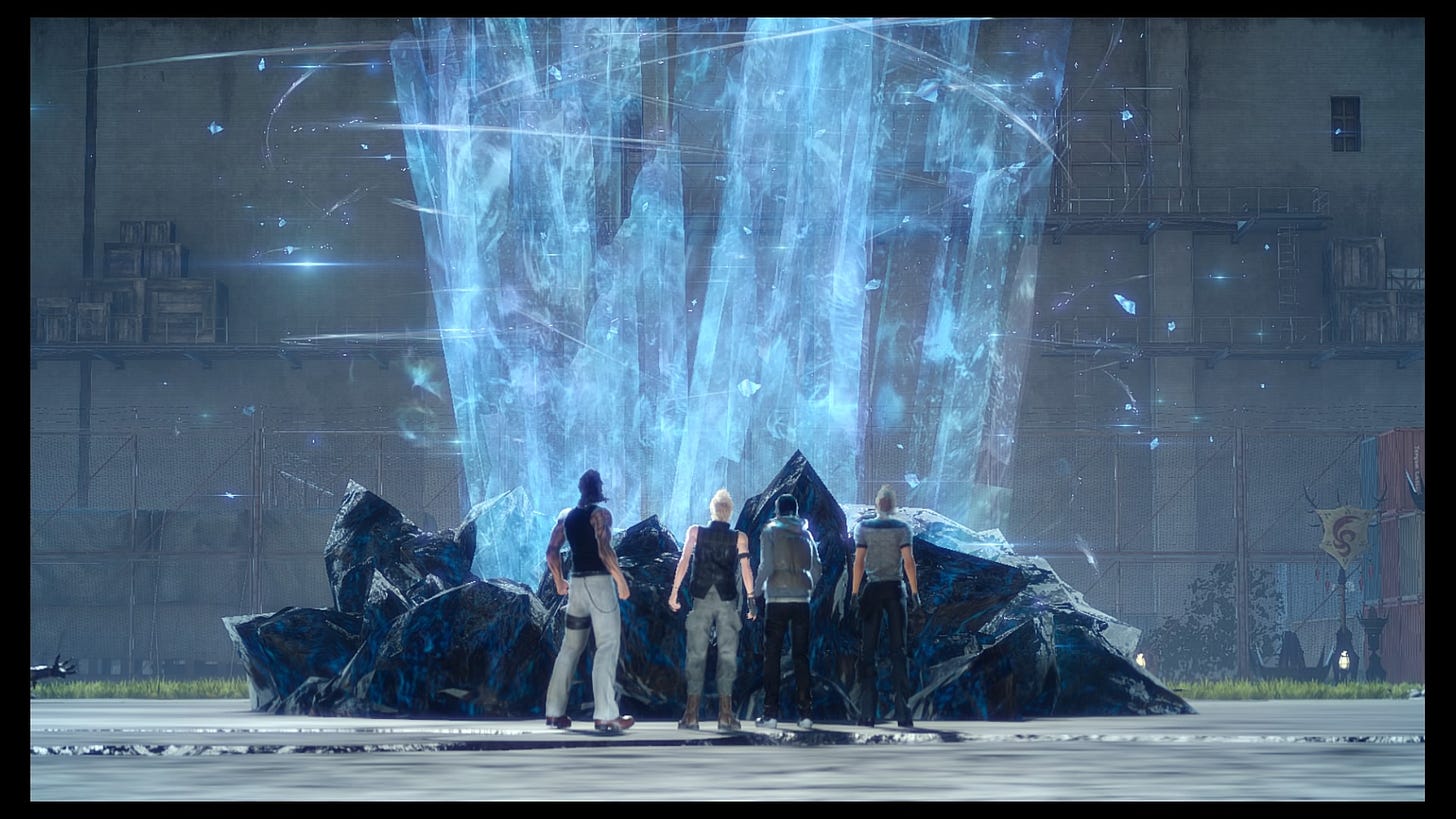Diamond Dust: Final Fantasy XV Is My Video Game Comfort Food
From the first push of the broken-down Regalia, I was charmed.
I am told that everyone has "their" Final Fantasy—usually the first one they ever played, which got them hooked on the engaging stories, expansive worlds, gorgeous music, and oddball characters that make the series such a beloved and enduring franchise. Mine is Final Fantasy XV, which is probably a kick in the teeth to some diehard purists, but from the first push of the broken-down Regalia, I was charmed.
Final Fantasy XV had been out for nearly two years by the time I picked it up in 2018. At that point in my life, I had recently uprooted everything to move in with my now-fiancé in New Jersey, hoping to find a position in my field after grad school. When I started the game in March, I was barely a month into my new job and Anthony was traveling a lot for work—usually for weeks at a time. With a narrow social circle that barely encompassed my office, I turned instead to Final Fantasy XV.
When I picked up the game, I was, bluntly, lonely as hell and acutely, uncomfortably aware of my newness to both my office and New York City. I had stepped out of a robust support network and into a vast unknown a lightyear away from the pink-collar jobs I held in Pittsburgh. With its varied cast, compelling fantasy setting, and charming relationships, Final Fantasy XV gave me an enormous world to sink my teeth into, one that kind of filled in the gaps of what I most missed about home.
The premise of the game, if you aren't familiar with it, is that you, Prince Noctis, and your royal retinue are on a road trip to Altissia. Once there, Noctis will marry Lady Lunafreya, uniting their countries Lucis and Tenebrae against the dual threats of Starscourge and the evil Niflheim empire. Naturally, this all goes horribly wrong and Noctis alone must prevent the world from being consumed by Starscourge (a cosmic malady bathing the world in unrelenting darkness) using some dubious crystal magic.
But that's all late-game stuff. I spent most of the 96 hours it took me to complete the game in the first half of the story. The world is huge, the side quests abundant, and even simple fetch quests and battles are multiplied by Yoko Shimomura's expansive, lively soundtrack. I wanted to explore every inch of it, and I did, accepting every quest, hunt, and task while I slowly wound my way across Eos and back.
In part I meandered because I get stressed about endings in games—not about the events of the final battles and cutscenes, but the end itself, the moment the game will wrest control of the narrative from me. I get stressed about time. I often wonder, if I were the main character, would I be satisfied when it comes time to fight the final battle? If I had to make a decision that affected the fate of the world, would I feel regret or a clear conscience, knowing I did everything the world has to offer?
To be sure, this is an existential way to play, especially in a world where New Game+ is all but a standard feature in big RPGs like Final Fantasy XV, but an ending is a boundary that can’t be uncrossed. I take joy in wandering until I have no choice but to move the story along. When I think of Final Fantasy XV, I don’t think of the set-piece battles with characters like Titan or Ifrit. Rather, I remember the more mundane scenes: calm hours spent fishing, exploring ruins, gathering ingredients and other collectibles.
The liminal space between rigid main-quest milestones defined my experience with Final Fantasy XV. Spending time in Eos kept me from feeling too lonely and from thinking too hard about knowing very few people in a new city. The fantasy element of Final Fantasy XV is grounded in reality, and though Noctis is royalty with magic powers and an arsenal of comically oversized swords, his affection for cats, video games, and sleeping makes him easy to relate to. The narrative has problems, sure, but I found it impossible to dislike any of the main characters—something that made it difficult to say goodbye.
The other, maybe slightly more pathetic reason I spent so much time with Final Fantasy XV is that it gave me something familiar—something friendly and genuine—to hold onto as I navigated the highs and lows of total independence. Among the games I consider favorites, they share a commonality in compelling characterization and relationships. Regardless of what you think of any of Final Fantasy's narratives, I think giving players someone to root for or rail against is something the series as a whole does incredibly well, and that passion naturally spills over into its online communities. This is why Final Fantasy XV became the video game equivalent of comfort food to me—it was an easy way to pass time that always left me satisfied and an easy point of connection with others online.
Of course, all good things must come to an end; eventually I ran out of side quests and locations to explore. At the same time, I widened my social and online circles in real life—I had reached a point where I was ready to move on and end the game. A player’s control over the game is always illusory. I could and did delay the game’s ending for dozens and dozens of hours, but Noctis will always have to enter the crystal sleep and return to Eos to fight the Starscourge once and for all. Still, I’m grateful to Final Fantasy XV, and for being able to spend time with it in both the fictional and real liminal.
Diamond Dust is a series of pieces covering the Final Fantasy franchise in all its beauty and pain.

